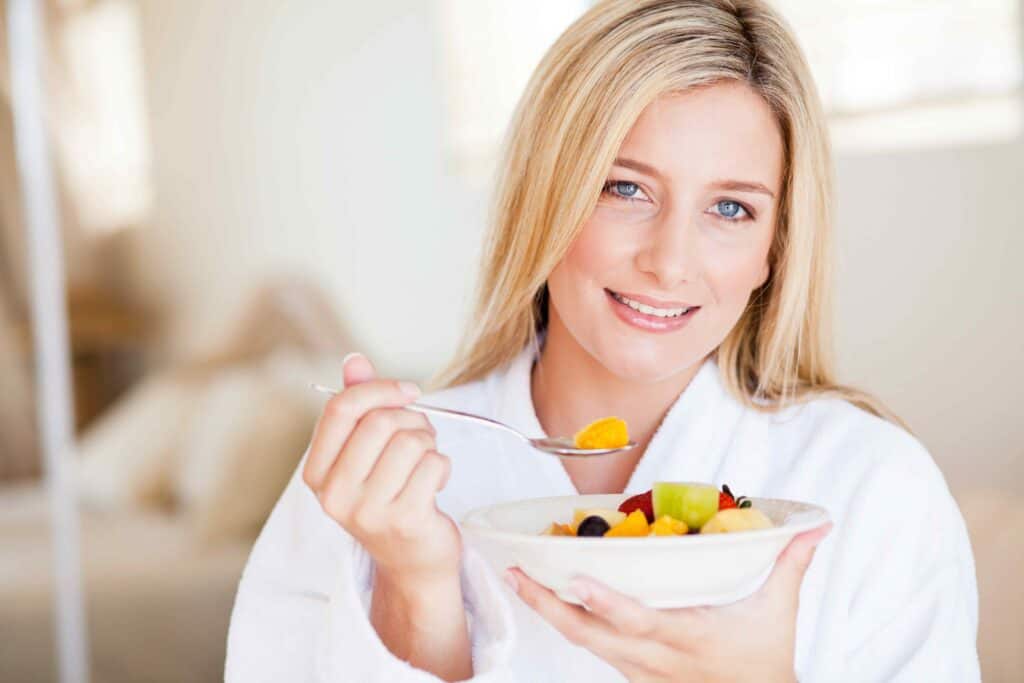A salad probably pops into your mind when you picture a healthy lunch. However, this dish has much more than a bit of iceberg lettuce with a few token strips of red cabbage and carrot thrown in for color. Salads are incredibly versatile, letting you add healthy ingredients that improve your overall health.
Are you ready to make today’s lunch extra special with a few healthy additions? Here are eight things you should add to your salad but probably aren’t.

1. Fatty Fish
When did you last add a scoop of tuna to your salad? Doing so could benefit your brain and cardiovascular health. Fatty fish is high in omega-3 fatty acids — a type of fat many Americans lack.
Although you need omega-3 and omega-6 fatty acids for optimal health, the problem is the proportion. The preponderance of vegetable oils in the American diet has upset the balance. Ideally, you should evenly balance your intake of each, but many people eat in favor of omega-6. The resulting imbalance contributes to chronic inflammation and weight gain.
Adding a bit of tuna or salmon to your salad helps restore balance. It also provides filling protein to keep you going through the afternoon doldrums.
2. Flax
What if you practice a vegetarian or vegan diet? Another way to get your omega-3s is through the magic of flax.
Should you buy whole or ground flaxseed to add to your salad? The ground form is easier to digest, as your intestines can have trouble breaking through the protective seed covering. Healthy oil in your dressing — such as olive or avocado oil — also boosts nutrient absorption.
3. Berries
Berries encompass the dark reds and blues on the color spectrum. This hue displays its anthocyanin content — an antioxidant that slows down age-related brain deterioration and protects your heart. Eating more berries can help prevent hypertension or high blood pressure contributing to heart attack risk.
Berries also add a delightful sweetness to salads that pair well with lighter, vinaigrette dressings like this antioxidant-packed power salad with honey dijon dressing. The hint of sugar helps balance the bitterness of deep, leafy greens.
4. Nuts
Nuts are the perfect alternative to croutons made from bleached white flour. Bleached flour has very little nutritional value and absorbs quickly, leading to a blood sugar spike and a crash that exhausts you. Nuts are high in several minerals essential to your mental and neurological health, including:
● Selenium: A single Brazil nut contains your full day’s RDA.
● Magnesium: This wonder mineral works better than an antidepressant in some patients with a deficiency.
● Zinc: You might know this mineral for its immune-boosting power, but it’s also great for your brain.
5. Seeds
Seeds are also sources of various minerals necessary for positive health, like iron and zinc. However, they’re particularly beneficial to females because they contain lignans — compounds found in plants that help balance female hormones. In women who menstruate, they can mitigate some of the symptoms of PCOS and other disorders. They may also benefit post-menopausal women by reducing their breast cancer risk.
6. Dried Fruit
Dried tropical fruits like mango supply you with beta-carotene — a precursor of vitamin A that benefits your visual health. Perhaps most importantly, they help cut the bitterness of deep, leafy greens.
Although there’s nothing wrong with iceberg lettuce, it isn’t the most nutrient-dense salad choice. However, many people stay away from field greens because of the bitter taste and thus deprive themselves of a complete vitamin and mineral intake. Instead, load your lunch with more of the good stuff.
7. Yogurt
Plain, unsweetened yogurt is one of a salad maker’s best friends. This stuff provides your body with a juicy heap of probiotics. This term refers to the live bacteria that inhabit your intestines and help you digest. Over time, your innate supply depletes from poor diet choices or antibiotic or alcohol use, but eating probiotic-rich foods can replenish your gut’s stash.
Simply put, plain yogurt is the ideal base for creamy salad dressings. Here’s a great simple recipe:
● 1 tablespoon plain, unflavored Greek yogurt
● 1 tablespoon olive oil
● 2 tablespoons balsamic vinegar
● 1 teaspoon Bragg’s 24-herb sprinkle
Simply add all ingredients to a closed jar, give it a shake and pour it over your favorite salad.
8. Spices
Finally, consider spicing up your salad with something more than salt and pepper. Many people neglect seasonings on salads, assuming they have plenty of flavor already. However, many herbs have healing properties that can enhance your overall health. For example:
● Oregano: Antioxidants and antimicrobial properties
● Parsley: Amazing source of vitamin K
● Echinacea: Immune-boosting antioxidants
Add These Ingredients to Your Salad
A salad sounds like a healthy lunch, but how nourishing it is depends on what you add. Break free from the iceberg mold and start adding these eight things to your salad to enhance its nutritional value — and flavor. You'll feel good about giving your body what it needs to thrive.
Mia Barnes is a health and wellness freelance writer who specializes in nutrition and self-care. Mia is also the Founder and Editor-in-Chief of Body+Mind magazine, an online healthy living publication.

Tell Us What You Think